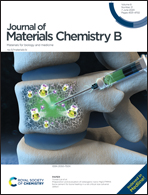The negatively charged microenvironment of collagen hydrogels regulates the chondrogenic differentiation of bone marrow mesenchymal stem cells in vitro and in vivo
Abstract
The differentiation of bone marrow mesenchymal stem cells (BMSCs) into functional chondrocytes is crucial for successful cartilage tissue engineering. Since the extracellular matrix (ECM) microenvironment can regulate the behaviours of BMSCs and guide their differentiation, it is important to simulate the natural cartilage ECM to induce the chondrogenesis of BMSCs. As the most abundant protein in the ECM, collagen hydrogels were found to provide a structural and chemical microenvironment for natural cartilage, and regulate the chondrogenic differentiation of BMSCs. However, as the negatively charged ECM microenvironment is crucial for chondrogenesis and homeostasis within cells in cartilage tissue, the electrical properties of collagen hydrogels need to be further optimized. In this study, three collagen hydrogels with different electrical properties were fabricated using methacrylic anhydride (MA) and succinic anhydride (SA) modification. The collagen hydrogels had a similar composition, storage modulus and integral triple helix structure of collagen, but their different negatively charged microenvironments significantly impacted the hydrophilicity, protein diffusion and binding, and consequently influenced BMSC adhesion and spreading on the surface of the hydrogels. Moreover, the BMSCs encapsulated in the collagen hydrogels also demonstrated improved sGAG secretion and chondrogenic and integrin gene expression with the increased negative charge in vitro. Similar results were also observed in subcutaneous implantation in vivo, where higher secretions of sGAG, SOX9 and collagen type II proteins were found in the collagen hydrogels with higher negative charge. Together, our results demonstrated that more negative charges introduced into the collagen hydrogel microenvironment would enhance the chondrogenic differentiation of BMSCs in vitro and in vivo. This revealed that the electrical properties are an important consideration in designing future collagen hydrogels for cartilage regeneration.



 Please wait while we load your content...
Please wait while we load your content...